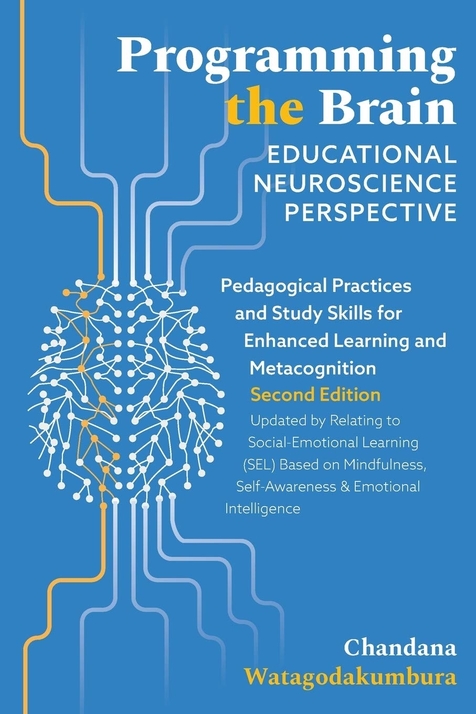
Professor and scientist Chandana Watagodakumbura examines the complex relationship between brain structure, neurological functioning, and how people behave based on their learning in Programming the Brain: Educational Neuroscience Perspective: Pedagogical Practices and Study Skills for Enhanced Learning and Metacognition.
As Watagodakumbura describes, educators are constantly exploring and quantifying the ways that students learn, in order to teach them most effectively. Neuroscience, a relatively new discipline, can offer insight into these processes, since human evolution parallels the evolution of the brain and neural system.
A salient example of the author’s thesis is presented in the introduction, looking at the difference between those with visual-spatial (right side of the brain) proclivities and those who learn through left side, sequential and auditory, abilities. Education often targets the latter primarily, but since it is now apparent that machines can keep time and utilize sequence (left-orientation skills) better than humans, what is needed is more emphasis on right side – creative and spatial – capacities. Watagodakumbura identifies the integration of both sides as “the premise of this book throughout,” and he lays the case out well.
Part I lays out basic facts about the brain, Part II examines learning theories in the light of neuroscientific concepts, Part II offers a survey of education through varying methodologies, and Part IV delves more deeply into standard teaching strategies and makes suggestions for curriculum design that take into account the need for integrative goals. Throughout, Watagodakumbura sets forth varying approaches to education and other forms of learning, showing how they directly affect cognition. He cites, for example, the distinction between explicit and implicit memory functions – academic learning often indoctrinates using explicit methods, leaving those with alternative perceptions out of the process. But fortunately, the brain has neuroplasticity, and is not rigidly determined by genetics, so those with one set of skills can learn with the other set relatively simply.
One factor of significant focus is the practice of mindfulness, generally associated with meditation, which gives the book a unique sense of scope, even beyond the initial premise, illustrating Watagodakumbura’s erudition and rigor with the subject. The author has appended to almost every chapter a section called “Author Reflections” in which he recalls his own learning struggles and accomplishments, and often mentions mindfulness, noting its proven ability to enhance both physical brain functions and general outlook. Research has shown that mindfulness practices can reduce chronic health problems such as heart disease, diabetes, and dementia, so this by no means takes the book into the realm of magical thinking, and instead expands the book’s scientific methodology.
Watagodakumbura states in the early pages of his highly readable treatise that he doesn’t expect learners or educators to immediately embrace the findings he has arrayed for examination here, but he is still very persuasive – in a sense underselling what he has achieved here. He writes with potent conviction, clearly expressing the current need for radical changes in “social and human-development spaces” that have the potential to create broad sustainability in place of narrow focus on technologies that merely reinforce and categorize data. Given the state of education today, and even the state of mainstream discourse, there is a very good case to be made for his arguments.
Watagodakumbura’s work, which follows other publications and is reflected in his work in developing curricula and assessment tools for higher education, is surprisingly fascinating even for the layman. For professional educators, this deep, philosophical re-thinking of this crucial subject is complex but essential reading.
Book Links
STAR RATING
Design
Content
Editing
Get an Editorial Review | Get Amazon Sales & Reviews | Get Edited | Publish Your Book | Enter the SPR Book Awards | Other Marketing Services























Leave A Comment